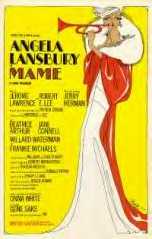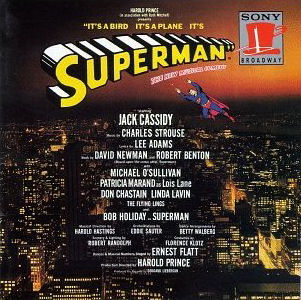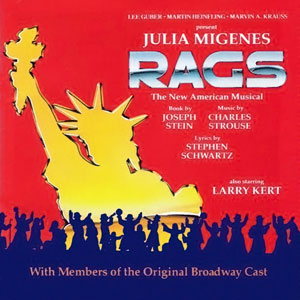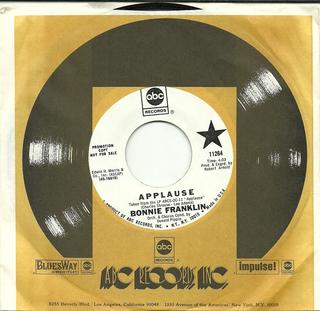
Hello, Dolly! is a 1964 musical with lyrics and music by Jerry Herman and a book by Michael Stewart, based on Thornton Wilder's 1938 farce The Merchant of Yonkers, which Wilder revised and retitled The Matchmaker in 1954. The musical follows the story of Dolly Gallagher Levi, a strong-willed matchmaker, as she travels to Yonkers, New York, to find a match for the miserly "well-known unmarried half-a-millionaire" Horace Vandergelder.

1776 is a musical with music and lyrics by Sherman Edwards and a book by Peter Stone. The show is based on the events leading up to the signing of the Declaration of Independence, telling a story of the efforts of John Adams to persuade his colleagues to vote for American independence and to sign the document. The show premiered on Broadway in 1969 where it received acclaim and won three Tony Awards, including Best Musical. The original production starred William Daniels as Adams, Ken Howard as Thomas Jefferson and Howard Da Silva as Benjamin Franklin.

Mame is a musical with a book by Jerome Lawrence and Robert Edwin Lee and music and lyrics by Jerry Herman. Originally titled My Best Girl, it is based on the 1955 novel Auntie Mame by Patrick Dennis and the 1956 Broadway play of the same name by Lawrence and Lee. A period piece set in New York City and spanning the Great Depression and World War II, it focuses on eccentric bohemian Mame Dennis, whose famous motto is "Life is a banquet and most poor sons of bitches are starving to death." Her fabulous life with her wealthy friends is interrupted when the young son of her late brother arrives to live with her. They cope with the Depression in a series of adventures.

The Wiz: The Super Soul Musical "Wonderful Wizard of Oz" is a musical with music and lyrics by Charlie Smalls and book by William F. Brown. It is a retelling of L. Frank Baum's children's novel The Wonderful Wizard of Oz (1900) in the context of contemporary African-American culture. It opened on October 21, 1974, at the Morris A. Mechanic Theatre in Baltimore, and moved to Broadway's Majestic Theatre with a new cast on January 5, 1975.

Bye Bye Birdie is a stage musical with music by Charles Strouse and lyrics by Lee Adams, based upon a book by Michael Stewart.

A Chorus Line is a 1975 musical with music by Marvin Hamlisch, lyrics by Edward Kleban, and a book by James Kirkwood Jr. and Nicholas Dante.

Charles Strouse is an American composer and lyricist best known for writing the music to such Broadway musicals as Bye Bye Birdie, Applause, and Annie.

Applause is a musical with a book by Betty Comden and Adolph Green, lyrics by Lee Adams, and music by Charles Strouse. The musical is based on the 1950 film All About Eve and the short story on which the movie is based, Mary Orr's "The Wisdom of Eve". The story centers on aging star Margo Channing, who innocently takes a fledgling actress under her wing, unaware that the ruthless Eve is plotting to steal her career and her man.

Loretta Devine is an American actress. She is known for numerous roles across stage and screen. Her most high profile roles include Lorrell Robinson in the original (1981) Broadway production of Dreamgirls, the long-suffering Gloria Matthews in the film Waiting to Exhale (1995), and her recurring role as Adele Webber on the medical drama Grey's Anatomy, for which she won a Primetime Emmy Award for Outstanding Guest Actress in a Drama Series in 2011.

All American is a musical with a book by Mel Brooks, lyrics by Lee Adams, and music by Charles Strouse. Based on the Robert Lewis Taylor 1950 novel Professor Fodorski, it is set on the campus of the fictional Southern Baptist Institute of Technology: the worlds of science and sports collide when the principles of engineering are applied to football strategies, and football strategies are used to teach the principles of engineering. The techniques of a Hungarian immigrant, Professor Fodorski, prove to be successful, resulting in a winning team, and he finds himself the target of a Madison Avenue ad man who wants to exploit his new-found fame.

Seesaw is a 1973 American musical with a book by Michael Bennett, music by Cy Coleman, and lyrics by Dorothy Fields.

It's a Bird... It's a Plane... It's Superman is a 1966 musical composed by Charles Strouse, with lyrics by Lee Adams and book by David Newman and Robert Benton. It is based on the comic book character Superman created by Jerry Siegel and Joe Shuster and published by DC Comics.

Pal Joey is a 1940 musical with a book by John O'Hara and music and lyrics by Richard Rodgers and Lorenz Hart. The musical is based on a character and situations O'Hara created in a series of short stories published in The New Yorker, which he later published in novel form. The title character, Joey Evans, is a manipulative small-time nightclub performer whose ambitions lead him into an affair with the wealthy, middle-aged and married Vera Simpson. It includes two songs that have become standards: "I Could Write a Book" and "Bewitched, Bothered and Bewildered".

I and Albert is a 1972 musical by composer Charles Strouse, and lyricist Lee Adams, with a book by Jay Presson Allen. The plot is based on the lives and love story of Queen Victoria and her husband Prince Albert of Saxe-Coburg and Gotha.

Rags is a musical with a book by Joseph Stein, lyrics by Stephen Schwartz, and music by Charles Strouse.
Portofino is a musical with a book by Richard Ney, lyrics by Ney and Sheldon Harnick, and music by Louis Bellson and Will Irwin.
Happy New Year is a musical with a book by Burt Shevelove and music and lyrics by Cole Porter.
William Ferdinand Brown was an American playwright, best known for writing the book of the musical, The Wiz (1974), which is an adaptation of L. Frank Baum's The Wonderful Wizard of Oz with music and lyrics by Charlie Smalls, for which Brown received a nomination for the Tony Award for Best Book of a Musical.
Marty is a stage musical version of the 1955 film of the same name written by Paddy Chayefsky. The musical has music by Charles Strouse and Lee Adams.

"Applause" is the title song from the 1970 Broadway musical Applause, with music by Charles Strouse and lyrics by Lee Adams, originally performed by Bonnie Franklin, who originated the role of Bonnie in the musical, and recorded as a single with orchestra and chorus conducted by Donald Pippin. The single was released with a B-side featuring the star of the production, Lauren Bacall, making her musical theatre debut, performing "Something Greater" together with Len Cariou. The single's popularity led to Franklin's being invited to perform it on the 24th Tony Awards broadcast on television, where the show gained Best Musical, Bacall Best Leading Actress in a Musical, but Bonnie Franklin missed out on the best supporting actress to Melba Moore.
















